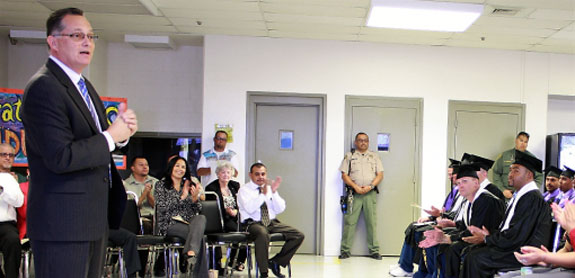
April 22, 2019; The Root and The Intercept
The way things are now, Jose Bou does not want his story to be held up as an example for others, even though most would find it inspiring. Bou was arrested twice and, while in prison for the second time, enrolled in a Boston University program offering college courses to people behind bars. He graduated with a near-perfect GPA and now has a master’s in criminal justice.
But, he says, “Don’t look at Jose Bou and say, ‘Why don’t you do it just like Jose? Straighten up, just like Jose?’ Because they don’t have the opportunity.”
That may change soon, if Congress passes the Restoring Education and Learning Act (REAL Act), which was proposed by Senators Brian Schatz (D-HI), Mike Lee (R-UT), and Dick Durbin (D-IL). The bill aims “to reinstate federal Pell grant eligibility for individuals incarcerated in federal and state penal institutions, and for other purposes.”
College courses offered to those in prison used to be quite common until the “tough on crime” era, when the 1994 Violent Crime Control and Law Enforcement Act banned incarcerated people from accessing Pell grants. Now, 60 percent of them have no access to post-secondary education. Kevin Ring, president of Families Against Mandatory Minimums, called the ban “a nasty fit of spite.”
In 2015, President Obama’s Second Chance Pell pilot program offered Pell grants to a limited number of people behind bars. Arne Duncan, then Secretary of Education, said, “The cost-benefit of this does not take a math genius to figure out. We lock folks up here, $35-40,000 every single year. A Pell grant is less than $6,000 each year.” The program has been a success: according to a study from the Vera Institute of Justice, repealing the ban increased employment rates and decreased recidivism rates among participants. It was renewed just this past February.
Sign up for our free newsletters
Subscribe to NPQ's newsletters to have our top stories delivered directly to your inbox.
By signing up, you agree to our privacy policy and terms of use, and to receive messages from NPQ and our partners.
That’s great, said Nick Turner, president and director of the Vera Institute, but “we encourage Congress and the White House to go one step further.”
Remarkably, there seems to be bipartisan agreement on this front. Inside Higher Ed’s Andrew Kreighbaum reports that “a coalition of groups with a broad range of ideological positions” supports repealing the ban, including current Secretary of Education Betsy DeVos.
There are some exciting numbers associated with this proposal: The Vera Institute estimates that 463,000 people could benefit from the repeal, and states would save $365 million per year in incarceration costs because enrollment in college courses reduces recidivism rates by nearly half. A 2014 survey found that 70 percent of inmates were interested in post-secondary education—again, something currently only 40 percent of them can access. Children are more likely to pursue higher education when their parents do, so the ban affects generations of potential students. Pell grants do not come from a static pool of money; no one will be denied a grant because someone else got one, so eligibility expansion is mostly a question of political will and about $2.7 billion extra in the budget.
But it’s not just about the numbers. Investing in someone’s education is a statement of belief in their worth and potential, a statement those in prison don’t often hear about themselves. The effect of education on recidivism rates demonstrates that behavior characterized and punished as “criminal” is often merely an attempt to survive poverty; if you want it to stop, you have to do something to alleviate the source problem. Aaron Kinzel, a doctoral student who began his bachelor’s degree behind bars, said, “If you give people the opportunity, nobody wants to go back to prison. Nobody wants to sell drugs and do all this grimy shit. It’s just sometimes, you don’t have a choice.”
Kinzel recalls the “lifers” he met in prison as “scholars…They have just been reading for decades and had changed their lives,” he said.
There is some quiet opposition to the bill from somewhat predictable figures like Senator Tom Cotton and former attorney general Jeff Sessions, and some questions about whether it would be lifted for, say, violent offenders. But it has support from the president and dozens of nonprofit groups, including the American Correctional Association, American Council on Education, Justice Action Network, FreedomWorks, FAMM, Prison Fellowship, Faith & Freedom Coalition, Equal Justice Initiative, Sentencing Project, the NAACP Legal Defense and Education Fund, and others. Reversing the ban would be a powerful step toward reversing harmful cultural narratives about the “justice” of the criminal justice system.—Erin Rubin













